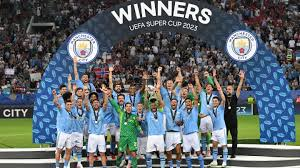UEFA super cup
It pits the champions of the UEFA Champions League against the winners of the UEFA Europa League, creating a clash between two of the best teams in Europe. The Super Cup serves as the curtain-raiser for the European club football season, traditionally held in August. Its history, evolution, and notable matches have made it a significant fixture in the football calendar.
Table of Contents
Origins and History
The UEFA Super Cup was conceived in 1971 by Anton Witkamp, a Dutch journalist who wanted to create a match between the winners of the European Cup (now the Champions League) and the Cup Winners’ Cup. The idea was to determine the supreme team in Europe. The first official Super Cup was held in 1973, featuring Ajax, the European Cup winners, and Milan, the Cup Winners’ Cup champions. Ajax won the inaugural Super Cup, establishing the precedent for future competitions.
Initially, the Super Cup was contested over two legs, with each team hosting one match. This format continued until 1998 when UEFA decided to make it a single match event, held at a neutral venue. This change aimed to increase the spectacle and convenience for fans and broadcasters.

Format and Evolution
The format of the UEFA Super Cup has undergone several changes since its inception. The most significant change came in 1999 when the Cup Winners’ Cup was abolished. UEFA decided that the Super Cup would be contested between the winners of the Champions League and the newly formed UEFA Cup (later rebranded as the UEFA Europa League). This change ensured that the competition remained relevant and competitive.
The Super Cup has been held in various iconic stadiums across Europe, including the Stade Louis II in Monaco, which hosted the event from 1998 to 2012. Since then, UEFA has rotated the hosting duties among different cities and countries, bringing the competition to a broader audience and allowing various regions to experience the excitement of a major European final.
Notable Matches and Moments
Over the years, the UEFA Super Cup has produced numerous memorable matches and moments that have etched themselves into football history. Some of the most notable include:
- Barcelona vs. Sevilla (2015): This match is often regarded as one of the greatest Super Cup encounters. Barcelona, featuring stars like Lionel Messi and Neymar, faced Sevilla in Tbilisi, Georgia. The match was a thrilling affair, with Barcelona eventually winning 5-4 after extra time. Messi’s two stunning free-kick goals and Pedro’s late winner were highlights of this unforgettable game.
- Real Madrid vs. Sevilla (2016): Another classic involving Sevilla, this time against Real Madrid in Trondheim, Norway. Sevilla led 2-1 until the dying moments of the match when Sergio Ramos scored a dramatic equalizer in the 93rd minute. Real Madrid went on to win 3-2 in extra time, with Dani Carvajal scoring a spectacular solo goal.
- Liverpool vs. Chelsea (2019): This match was significant as it was the first Super Cup to feature two English clubs. Held in Istanbul, Turkey, the game ended 2-2 after extra time, leading to a penalty shootout. Liverpool emerged victorious, winning 5-4 on penalties, with Adrian saving Tammy Abraham’s decisive spot-kick.
Impact and Significance
The UEFA Super Cup holds a unique place in European football. While it may not carry the same prestige as the Champions League or domestic league titles, it is a coveted trophy that showcases the best of European club football. Winning the Super Cup is seen as a testament to a team’s ability to compete at the highest level and serves as a morale booster at the start of the new season.
For players and managers, the Super Cup offers an opportunity to add another prestigious title to their collection. It also provides a platform for new signings to make an immediate impact and for teams to gauge their readiness for the upcoming season. The match often features some of the best talents in world football, making it a must-watch event for fans.
Financial and Commercial Aspects
The UEFA Super Cup also holds significant financial and commercial importance. The match attracts a global audience, with millions of fans tuning in from around the world. This global reach translates into substantial broadcasting and sponsorship revenue for UEFA and the participating clubs. The host city benefits economically from the influx of fans and media, boosting local tourism and business.
Sponsorship deals and commercial partnerships surrounding the Super Cup have grown over the years, reflecting the increasing commercial value of European football. Major brands vie for association with the event, further enhancing its profile and revenue potential.
Future Prospects
As European football continues to evolve, the UEFA Super Cup remains a fixture that adapts to the changing landscape. Discussions about expanding the competition to include more teams or integrating new formats are ongoing, reflecting the desire to keep the Super Cup relevant and exciting for future generations.
One potential development is the inclusion of the winners of the UEFA Europa Conference League, a new competition introduced in the 2021-2022 season. This could create a three-team tournament, adding an extra layer of competition and intrigue to the Super Cup.
https://indianfastearning.com/
Conclusion
The UEFA Super Cup is more than just a pre-season fixture; it is a celebration of European football’s best. From its humble beginnings to its current status as a global spectacle, the Super Cup has provided fans with unforgettable moments and legendary performances. It serves as a reminder of the rich history and enduring appeal of European club football, setting the stage for the battles and dramas that unfold in the season ahead. As the Super Cup continues to evolve, it remains a symbol of excellence, unity, and the enduring spirit of competition in European football.







